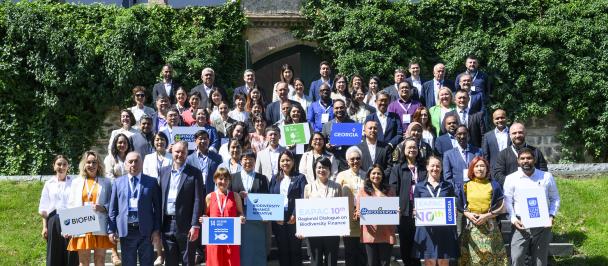UNECE, IKI, and UNDP to Support Regional Initiative for Energy-Efficient Buildings
Seven Countries Across Eastern Europe and Central Asia to Work Together to Transform Construction Sectors and Achieve Climate Goals
November 24, 2023

Tbilisi hosted an international workshop on 22 November, convening over 70 representatives from Armenia, Georgia, Kyrgyzstan, the Republic of Moldova, Tajikistan, Ukraine, and Uzbekistan. The focus of the workshop was to explore innovative strategies for enhancing energy efficiency in the building and construction sectors.
The event highlighted a regional project "Improving the Energy Efficiency of the Global Building Supply Chain Industry and its Products to Deliver High-Performance Buildings", which will be implemented in these seven countries from 2024 to 2029, with funding from the International Climate Initiative (IKI) Germany.
The United Nations Economic Commission for Europe (UNECE) will take the lead in this regional endeavour, in close cooperation with a range of implementing partners, including the United Nations Development Programme (UNDP) in all seven countries, the United Nations Environment Programme (UNEP), the United Nations Economic and Social Commission for Asia and the Pacific (UNESCAP), the UNEP Copenhagen Climate Centre (CCC), the Green Building Alliance (GBA), the Institute for Energy Efficiency in Production (EEP), and the Passive House Institute (PHI).
The workshop participants discussed the outcomes of the six-month preparation phase, which laid the groundwork for this regional effort, focusing on energy efficiency best practices and technical expertise tailored to the specific needs of the seven participating countries.
Vakhtang Tsintsadze, Deputy Minister of Economy and Sustainable Development of Georgia opened the workshop and emphasized the importance of the activities planned for Georgia and a firm commitment from the Government to cooperate in the project implementation.
Dario Liguti, UNECE Director of Sustainable Energy Division, emphasized the critical role of energy efficiency in buildings.
"We envision buildings as energy producers, not energy sinks. With this new initiative, the participating countries will gain access to research data and technologies aligning with UNECE energy efficiency guidelines."Dario Liguti, UNECE Director of Sustainable Energy Division
Douglas Webb, UNDP Resident Representative a.i. in Georgia, underscored the significance of the initiative for Georgia, a country that has already adopted its National Low-Emission Development Strategy, updated its Nationally Determined Contribution under the Paris Agreement, and introduced a range of environment-friendly legislation, including the Law on Energy Efficiency in line with the European Union’s Energy Efficiency Directive.
"Construction and building sectors play a critical role in achieving national climate goals. In Georgia, the residential sector is responsible for 73 percent of national greenhouse gas emissions. Advancing the right policies and accelerating smart investments to decarbonize the building and construction sectors and introduce energy-efficient technologies in housing is no longer a choice but an imperative."Douglas Webb, UNDP Resident Representative a.i. in Georgia
Nadja Hedler from the Federal Ministry for Economic Affairs and Climate Action of Germany, and Lidija Christmann, Head of Development Cooperation South Caucasus at the Embassy of Germany to Georgia, expressed their confidence that the successful implementation of this project will contribute to improving the energy efficiency of the building industry sector in the region.
Background Information
The new regional initiative "Improving the Energy Efficiency of the Global Building Supply Chain Industry and its Products to Deliver High-Performance Buildings" (2024-2029) aims to provide international funding and technical support to all seven participating countries, fostering a robust foundation for enhancing the energy efficiency of their building and construction sectors. With funding for Georgia exceeding EUR 1.3 million, the initiative aligns with the country's commitment to Nationally Determined Contributions under the Paris Agreement, driving national progress toward a sustainable and climate-sensitive future.
Media Contacts
- Sophie Tchitchinadze, UNDP, +995 599 196907, sophie.tchitchinadze@undp.org
- Ira Sulava, UNDP, +995 599 579105, irine.sulava@undp.org

 Locations
Locations



